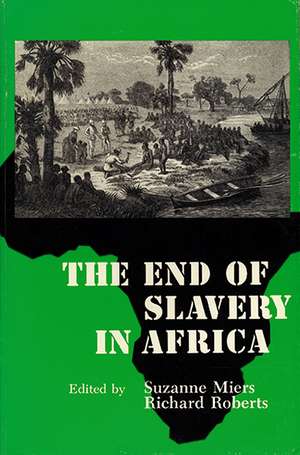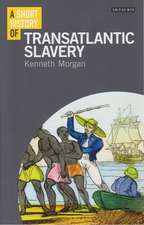The End of Slavery in Africa
Editat de Suzanne Miers, Richard Robertsen Limba Engleză Paperback – 14 noi 1988
This is the first comprehensive assessment of the end of slavery in Africa. Editors Suzanne Miers and Richard Roberts, with the distinguished contributors to the volume, establish an agenda for the social history of the early colonial period—hen the end of slavery was one of the most significant historical and cultural processes. The End of Slavery in Africa is a sequel to Slavery in Africa, edited by Suzanne Miers and Igor Kopytoff and published by the University of Wisconsin Press in 1977. The contributors explore the historical experiences of slaves, masters, and colonials as they all confronted the end of slavery in fifteen sub-Saharan African societies. The essays demonstrate that it is impossible to generalize about whether the end of slavery was a relatively mild and nondisruptive process or whether it marked a significant change in the social and economic organization of a given society. There was no common pattern and no uniform consequence of the end of slavery. The results of this wide-ranging inquiry will be of lasting value to Africanists and a variety of social and economic historians.
Preț: 241.29 lei
Nou
Puncte Express: 362
Preț estimativ în valută:
46.17€ • 48.33$ • 38.43£
46.17€ • 48.33$ • 38.43£
Carte tipărită la comandă
Livrare economică 31 martie-14 aprilie
Preluare comenzi: 021 569.72.76
Specificații
ISBN-13: 9780299115548
ISBN-10: 0299115542
Pagini: 544
Ilustrații: 16 maps
Dimensiuni: 152 x 229 x 36 mm
Greutate: 0.83 kg
Ediția:1
Editura: University of Wisconsin Press
Colecția University of Wisconsin Press
ISBN-10: 0299115542
Pagini: 544
Ilustrații: 16 maps
Dimensiuni: 152 x 229 x 36 mm
Greutate: 0.83 kg
Ediția:1
Editura: University of Wisconsin Press
Colecția University of Wisconsin Press
Recenzii
"The end of slavery is one of the most misunderstood major social changes to take place in colonial Africa. Many people believe that the Emancipation Act of 1834 ended all slavery in the British empire. It did not; forms of slavery continued under British and French rule into the 1930s. Miers and Roberts' collection of essays goes a long way to correct false impressions. The editors provide an excellent introduction to the volume, and Igor Kopytoff's concluding essay on African emancipation in its rural context is alone worth the price of admission."—Philip D. Curtin, The Johns Hopkins University
"This book makes an important contribution to the study of African history. Focusing on the end of slavery, it gives us another vantage point from which to view colonial rule, and provides insights not thus far given by studies into resistance and collaboration, labour history and colonial policy."—Ken Smith, University of South Africa
"The editors . . . seemed to have relished the search for the unique in their encyclopaedic catalogue of various possibilities in emancipation. . . . The more lasting contribution of the book is perhaps the fifteen case studies across Africa from Mauritania to Mozambique."—Abdul Sheriff, University of Dar es Salaam
"This book makes an important contribution to the study of African history. Focusing on the end of slavery, it gives us another vantage point from which to view colonial rule, and provides insights not thus far given by studies into resistance and collaboration, labour history and colonial policy."—Ken Smith, University of South Africa
"The editors . . . seemed to have relished the search for the unique in their encyclopaedic catalogue of various possibilities in emancipation. . . . The more lasting contribution of the book is perhaps the fifteen case studies across Africa from Mauritania to Mozambique."—Abdul Sheriff, University of Dar es Salaam
Descriere
This is the first comprehensive assessment of the end of slavery in Africa. Editors Suzanne Miers and Richard Roberts, with the distinguished contributors to the volume, establish an agenda for the social history of the early colonial period—hen the end of slavery was one of the most significant historical and cultural processes. The End of Slavery in Africa is a sequel to Slavery in Africa, edited by Suzanne Miers and Igor Kopytoff and published by the University of Wisconsin Press in 1977. The contributors explore the historical experiences of slaves, masters, and colonials as they all confronted the end of slavery in fifteen sub-Saharan African societies. The essays demonstrate that it is impossible to generalize about whether the end of slavery was a relatively mild and nondisruptive process or whether it marked a significant change in the social and economic organization of a given society. There was no common pattern and no uniform consequence of the end of slavery. The results of this wide-ranging inquiry will be of lasting value to Africanists and a variety of social and economic historians.















